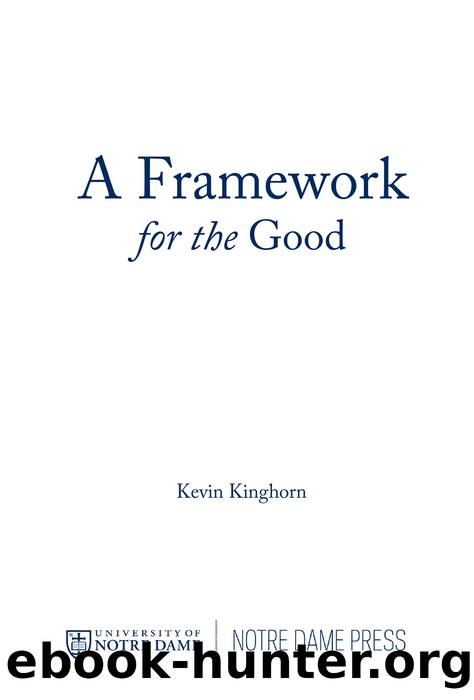A Framework for the Good by Kinghorn Kevin;

Author:Kinghorn, Kevin;
Language: eng
Format: epub
Publisher: University of Notre Dame Press
Published: 2016-08-15T00:00:00+00:00
4.3 ARE RELATIONSHIPS THE KEY TO OUR WELL-BEING?
Although God is relational by nature, and although the Christian perspective I am endorsing is that our flourishing consists in relating rightly to others, it would be too strong to claim that the flourishing of any possible creature God creates could occur only through participation in personal relationships. There could be creatures who flourish in isolation and who, like amebas, even reproduce asexually. Though in a minimal sense their flourishing would depend on their being related to God (after all, in the Christian worldview all creatures will be sustained in existence by God), it is not necessary that their flourishing depend, as human flourishing does, on their being in loving relationships with others. There might conceivably be creatures, for instance, that flourish as they reflect other aspects of Godâsuch as aesthetic ones. Christian hymns of worship sometimes speak of human limitations to appreciate the beauty of God. And it is entirely possible that there could be other creatures whose ultimate flourishing chiefly consists in their much greater capacity to recognize and contemplate the aesthetic aspects of Godâs nature. Still, the Christian view of human flourishing that I wish to explore sees it as an essential fact about any human that he or she will ultimately flourish only by relating to God and others in loving, self-giving ways.
A comparison with Robert Adamsâs views is instructive here. Adams has proposed that human well-being consists in enjoyment of the excellent, where âexcellenceâ for a finite thing involves its resembling God, who is infinite, personified excellence.19 Though this proposal shares with my own account certain central, Christian affirmationsâsuch as that human flourishing ultimately depends on oneâs relation to Godâit differs from my own account in important respects. As we saw in chapter 1, Adams, following Plato, understands the Good (or, as Adams calls it, the âexcellentâ) in terms of âthat which is worthy of love or admirationâ (1999, 13). For Adams, something can have goodnessâwhich is an intrinsic qualityâwhether or not anyone is enjoying it.
By contrast, I argued in chapter 1 that the meaning of âgoodâ cannot be divorced from the question of whether that which is said to be good is promoting someoneâs interests or well-being. In chapter 2 I made a similar affirmation about the nature of goodness, arguing, in contrast to Adams, that âwhat is goodâ cannot be separated from âwhat is good forâ someone.
Differences in theistic, ethical frameworks can often (if not always) be traced to differing conceptions of the nature of God. Perhaps the heart of the differences between Adamsâs account of goodness and my own account involves the different aspects of God we wish to emphasize. While Adams emphasizes the intrinsic qualities of God that are worthy of âlove and admiration,â my own starting point in describing God is to emphasize the point that God is life itself. On my account, then, God is the source of goodness because God brings lifeâthat is, states of flourishingâto finite creatures like us. Adams may be correct that any contingent being or thing that is good will resemble God in some way.
Download
This site does not store any files on its server. We only index and link to content provided by other sites. Please contact the content providers to delete copyright contents if any and email us, we'll remove relevant links or contents immediately.
Fangirl by Rainbow Rowell(9252)
How to Bang a Billionaire by Alexis Hall(8156)
Wonder by R. J. Palacio(8113)
The Thirst by Nesbo Jo(6944)
The Space Between by Michelle L. Teichman(6941)
Assassin’s Fate by Robin Hobb(6223)
Wiseguy by Nicholas Pileggi(5787)
The Night Circus by Erin Morgenstern(5224)
Paper Towns by Green John(5191)
The Kite Runner by Khaled Hosseini(5180)
Bittersweet (True North #1) by Sarina Bowen(4845)
Gerald's Game by Stephen King(4654)
Too Much and Not the Mood by Durga Chew-Bose(4348)
Pillow Thoughts by Courtney Peppernell(4284)
Goodbye Paradise(3810)
Twelve Days of Christmas by Debbie Macomber(3567)
Good by S. Walden(3560)
The Rosie Effect by Graeme Simsion(3468)
The Cellar by Natasha Preston(3345)
